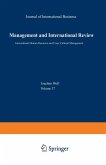A fundamental challenge that management faces in the twenty-first century is how to exercise adequate control, i. e. how to guide and direct the behaviour of their subordinates. With increasing globalisation firms witness a cross-cultural impact too. Of particular interest is the question of whether to use the standardized form of control similar to the home base of firms or whether to adapt their control practices to the local specificities. Given the meagre state of the literature in management control with a cross-cultural emphasis, this study addresses a real world problem, namely the question whether management control practices are configured similarly or differently across cultures. Relying on a generalized industry sample across four countries (Belgium, Canada, Germany and Poland), this study sought to shed light on one of the more intriguing questions ¿ ¿does culture matter¿ ¿ for specific control areas, in particular for performance measurement, performance evaluation and reward systems. The theoretical foundations are grounded in the cultural framework of the GLOBE project accompanied by thoughts of new institutionalism, stakeholder theory and contingency thoughts. Hypotheses are tested by mean comparisons (ANOVA, ANCOVA). The empirical findings highlight cultural differences for a broader set of control practices and deliver new insights into the intersection of culture and management control. This dissertation crafts a novel topic with high relevance for both researchers and practitioners. The study demonstrates areas for which management control practices should be adapted to the local needs and areas for which those practices could be harmonized in the whole company. This monograph stresses some areas in which future empirical cross-cultural research can benefit, and some areas where conceptual thoughts could be advanced.
Hinweis: Dieser Artikel kann nur an eine deutsche Lieferadresse ausgeliefert werden.
Hinweis: Dieser Artikel kann nur an eine deutsche Lieferadresse ausgeliefert werden.








